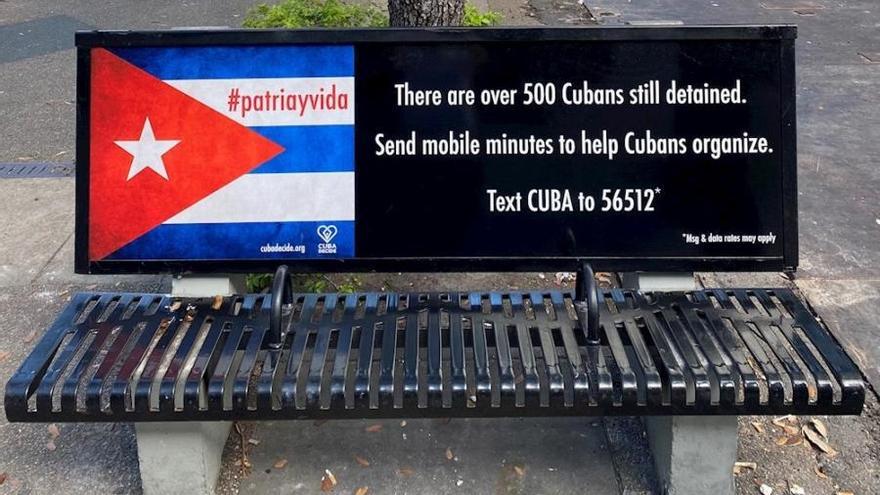
![]() EFE (via 14ymedio), Miami, 11 January 2022 — Cuban-American artists Antonia Wright and Rubén Miralles have volunteered to support a plan that will keep members of the Cuban opposition connected so they may coordinate amongst themselves and inform on events on the Island through something as simple as donations to pay for cell phone minutes.
EFE (via 14ymedio), Miami, 11 January 2022 — Cuban-American artists Antonia Wright and Rubén Miralles have volunteered to support a plan that will keep members of the Cuban opposition connected so they may coordinate amongst themselves and inform on events on the Island through something as simple as donations to pay for cell phone minutes.
Wright and Miralles, known for their art in public spaces, have transformed two benches at strategically located bus stops in Miami-Dade county with text that alludes to political prisoners on the Island, which number more than 500 after the July 11th protests, and “Patria y Vida” [Homeland and Life], the anthem of those demanding political change in Cuba.
In addition, those benches, one located in the center of Miami and another in Hialeah, a city where the majority of the population is Cuban, urge people to send a text message with the word “Cuba” to 56512, through which donations of any amount can be made to “recharge” mobile phones of people on the Island.
“There are still more than 500 Cubans detained. Send mobile minutes to help Cubans organize,” the bench reads, along with the number to be texted, a Cuban flag and “#patriayvida.”
Wright and Miralles, who are partners in life, not just in art, told Efe that the purpose of this project is to support the social protest and help people on the Island.
Donations will be distributed by Cuba Decide, which defends the right of Cubans to decide which political system they want, because, according to the artists, they can ensure these funds “directly reach those who need them,” without Cuban government intervention.
Rosa María Payá, Cuba Decide’s leader, told Efe that being connected amongst themselves and with the world is fundamental for opposition members and activists on the Island.
“When Cubans are connected, mobilization is much more effective,” emphasized Payá, to signal the important role cell phones played on July 11th, the largest protests on the Island since 1959.
It is also important so they can make known the results of repression unleashed by the Government since then, the situation of political prisoners, and the trials to which those that participated in the protests are subjected, she added.
Cuba Decide has launched a campaign targeting Cuban-American artists and small business owners to volunteer and raise funds to help the cause of freedom in Cuba.
“We appreciate all the friends for their help in elevating the voices of those who have no voice, supporting our movement until we achieve freedom and democracy in Cuba,” adds Cuba Decide on its Instagram account.
Translated by: Silvia Suárez
____________
COLLABORATE WITH OUR WORK: The 14ymedio team is committed to practicing serious journalism that reflects Cuba’s reality in all its depth. Thank you for joining us on this long journey. We invite you to continue supporting us by becoming a member of 14ymedio now. Together we can continue transforming journalism in Cuba.
